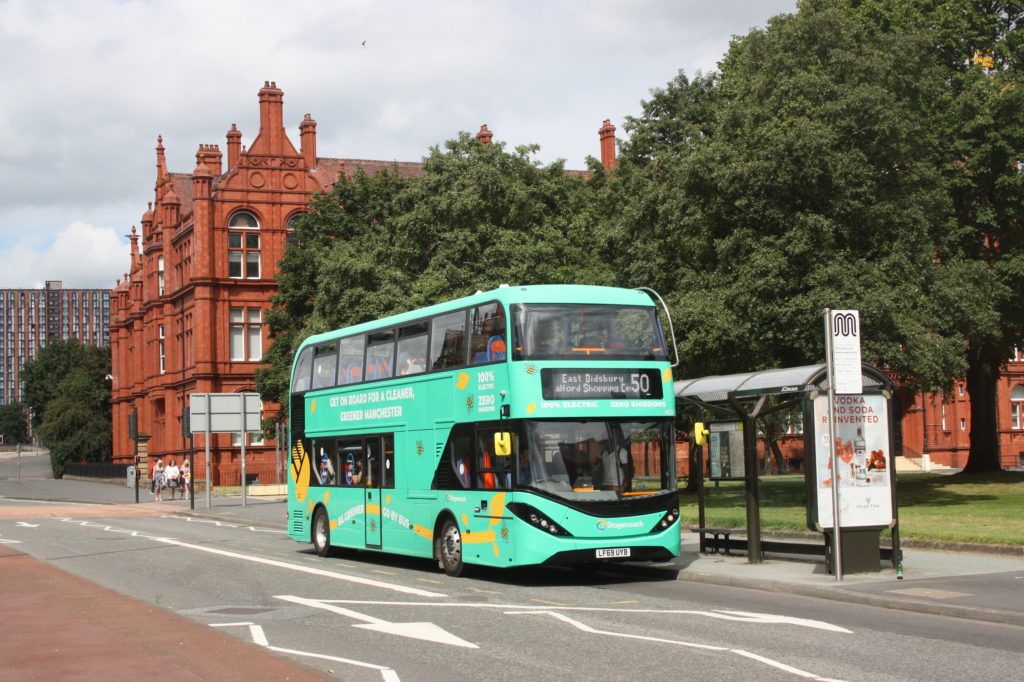Stagecoach calls for radical behaviour change
Stagecoach urges end to ‘ridiculous situation’ with Clean Air Zones
As part of its new sustainability strategy, Stagecoach has warned authorities must address the “contradictory policies and mixed messaging being sent to citizens” over climate change action.
The operator’s new Driving Net Zero: Better Places to Live and Work document calls for “radical behaviour change and incentives to reward the right choices” to make national government Net Zero ambitions a reality.
Martin Griffiths, Stagecoach Chief Executive, has stressed an end to what he describes as the ‘ludicrous situation’ with Clean Air Zones (CAZs). He said some CAZ plans effectively tax bus passengers, which he says are making a sustainable choice, but do not address diesel cars, which contribute to pollution.
Stagecoach’s strategy sets out plans that investment in new zero-emissions fleets and other green technologies over the next 15 years to reduce the impact of the company’s operations on the planet, as well as initiatives to cut waste, boost recycling and conserve water.
Stagecoach is aiming to decarbonise its business by around 70% by 2035 as well as targeting having a zero-emissions UK bus fleet by that date.
In addition, Stagecoach has confirmed plans to sign up to the global Race to Zero campaign and has also started working towards setting science-based targets for ratification by the Science Based Targets initiative, consistent with the 2015 Paris Agreement to limit global warming to 1.5°C by 2050.
The phased plan to fully decarbonise the company’s operations will see a switch away from diesel to zero-carbon technologies, including electric and hydrogen. Stagecoach has already invested £1bn in 7,000 new greener vehicles in the last decade, including one of the biggest orders of e-buses in Europe.
Other new key environmental targets include:
- Purchasing only 100% renewable energy for Stagecoach buildings and fleet
- Aligning energy management systems with the international standard ISO50001 by 2027
- 95% of waste diverted from landfill by 2026 and 98% by 2031
- Reducing resource use by further digitalising systems
- Progressing a climate adaptation programme to risk assess and protect facilities
“We need an end to the ludicrous situation where some clean air zone plans effectively tax bus passengers making a sustainable choice but do nothing to address diesel cars” – Martin Griffiths, Stagecoach Chief Executive
Martin Griffiths, Stagecoach Chief Executive, said: “Stagecoach is a force for good and our strategy starts with what we can do in our own business to help transform society for the better. But we also need to make changes individually and work together to achieve our goals.
“The country will not deliver on its ambitions by grand strategies or technology change alone. We need radical behaviour change and incentives to reward the right choices to make net zero a reality. We need to be more honest about the scale of the challenge and the changes we will need to make to how we live now.
“Governments need to get real and stop cherry-picking the easy wins. We urgently need practical changes by national and regional government to address contradictory policies and mixed messaging currently being sent to citizens. We need an end to the ludicrous situation where some clean air zone plans effectively tax bus passengers making a sustainable choice but do nothing to address diesel cars contributing to the deaths of tens of thousands of people in our communities every year.
“Our current tax system and approach to road management puts cars first and is directly resulting in higher fares for people doing the right thing and choosing greener bus travel”
“Our current tax system and approach to road management puts cars first and is directly resulting in higher fares for people doing the right thing and choosing greener bus travel.
“The biggest opportunity to address climate change and protect our communities from extreme weather, poor air quality and the road traffic gridlock strangling our economy is not from electrifying Britain’s transport system. It is from incentivising the country to switch from cars to greener and healthier public transport and active travel.”
Last year, Stagecoach called for a “grown-up conversation” to re-examine fiscal policy as the government considers how to pay for the coronavirus pandemic. This would see a ‘polluter pays’ principle, with sustainable behaviours and use of public transport rewarded to make these modes more affordable and accessible to all.
The new Stagecoach sustainability strategy also includes a package of investment in its employees and measures to build on the company’s significant annual contribution to the country’s economy and communities, which was independently assessed before the Covid-19 pandemic as totalling £1.6billion a year.
